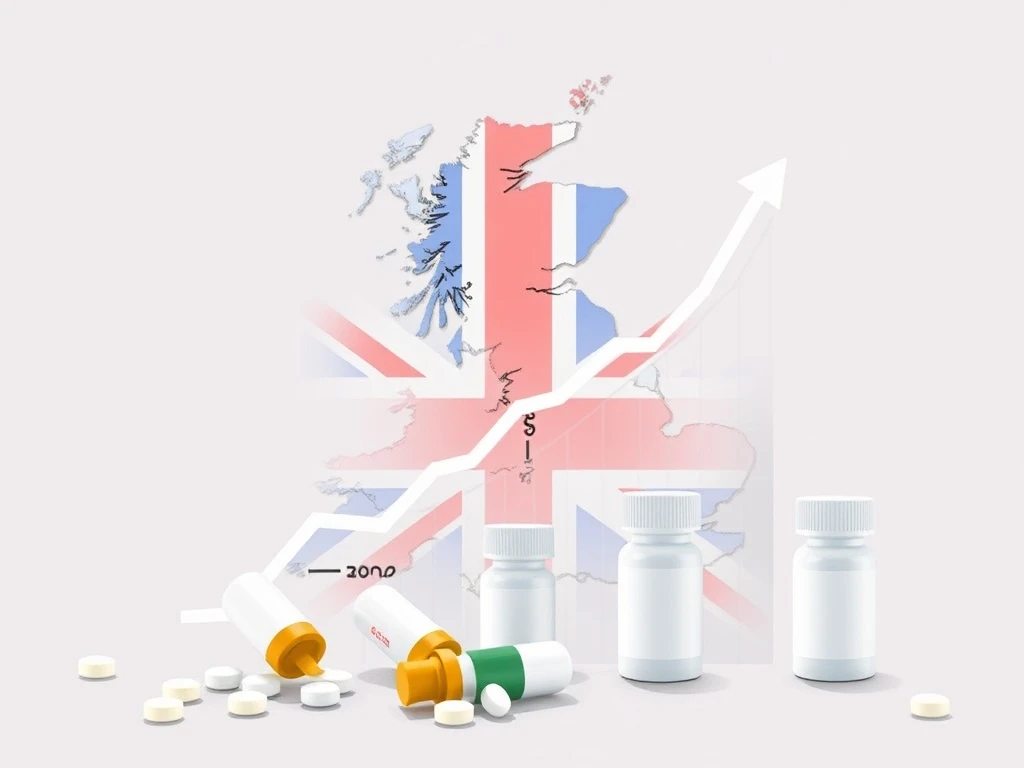A significant Mounjaro UK price increase is set to impact private patients, with costs soaring by up to 170% from September. This dramatic rise follows direct pressure from US President Donald Trump on pharmaceutical companies. The move highlights growing international tensions over drug pricing and its potential effects on healthcare access. Many British patients using the popular weight-loss jab privately will now face substantially higher expenses. This change reflects a broader push for global pricing consistency by major drug manufacturers.
The Price Hike Explained: Mounjaro UK Price Increase Details
Eli Lilly, the US drugmaker behind Mounjaro, announced the steep increase. From September 1, the price of a Mounjaro injection pen, which contains four doses, will jump significantly. Previously, these pens cost between £92 and £122. Now, depending on the specific dosage, prices will range from £133 to £330. This substantial adjustment applies directly to private healthcare providers. Consequently, patients accessing the medication outside the National Health Service (NHS) will bear the brunt of these increased costs. The company stated this action addresses “pricing inconsistencies compared to other developed countries.” They aim to align the UK list price more closely with the European average. This strategic pricing shift could redefine affordability for many private users.
Behind the Surge: Trump’s Influence on Drug Costs
The catalyst for this Mounjaro UK price increase stems largely from recent demands by US President Donald Trump. Days before Eli Lilly’s announcement, Mr. Trump sent letters to several major pharmaceutical firms, including AstraZeneca and GSK. He urged them to “negotiate harder with foreign freeloading nations.” Furthermore, he demanded that “increased revenues abroad are repatriated” to benefit American patients. This aggressive stance aims to lower drug costs within the United States. Historically, many developed nations have paid less for pharmaceuticals than the US. Trump’s administration seeks to rebalance this global pricing disparity. His pressure campaign signals a clear intent to shift financial burdens internationally.
Eli Lilly’s Justification for the Mounjaro Price Adjustment
Eli Lilly defended its decision to implement the Mounjaro UK price increase. The company stated that the UK had previously enjoyed prices “significantly below the European average.” They assert that new clinical evidence supports Mounjaro’s continued value and efficacy. This justification suggests a move towards market equilibrium rather than a punitive measure. The drugmaker emphasizes its commitment to fair global pricing. They believe the new pricing structure better reflects the medication’s worth. Moreover, the company highlighted its efforts to maintain patient access. They reached an agreement with the NHS to ensure continued supply for eligible patients, although NHS pricing remains confidential.
Broader Economic Implications: UK-US Trade and Drug Pricing
This significant Mounjaro UK price increase fuels wider concerns about medicine costs in Britain. A recent UK-US trade agreement includes provisions for the NHS to review drug pricing. This review aligns with US concerns regarding perceived global pricing disparities. Sir Pascal Soriot, CEO of AstraZeneca, has previously voiced support for “price equalisation” between countries. He argues that the US currently bears an disproportionate share of drug costs. This ongoing debate suggests a potential wave of higher medicine prices across various drugs in the UK. The Mounjaro situation could serve as a precedent for future pricing negotiations. Consequently, the pharmaceutical landscape in Britain may undergo substantial changes.
Mounjaro: What Patients Need to Know About the Medication
Mounjaro, scientifically known as tirzepatide, is a highly effective medication. It helps with weight loss and manages type 2 diabetes. The drug works by mimicking natural hormones that regulate blood sugar and appetite. In the UK, Mounjaro is available via GPs on the NHS for specific patients. Eligibility typically requires a Body Mass Index (BMI) over 40. Patients must also have at least four specified health conditions, including type 2 diabetes. For private prescriptions, eligibility starts at a BMI of 30. This wider private access means more individuals could be affected by the price hike. Patients should understand their eligibility criteria.
NHS Stance and Patient Access Amidst Mounjaro UK Price Increase
An NHS England spokesperson addressed the Mounjaro UK price increase. They confirmed that the approved list price increase “will not affect NHS commissioning” of Mounjaro. This means eligible NHS patients should continue to receive their medication without direct impact on their prescribed costs. However, the spokesperson advised individuals with private prescriptions to contact their provider. They should inquire about the new pricing structure and any associated changes. NHS pricing agreements are typically distinct from private market rates. Therefore, the public health service maintains its own confidential terms with drug manufacturers. This separation aims to protect patient access.
Future of UK Drug Costs: What Lies Ahead?
The Mounjaro situation could signal a trend. More pharmaceutical companies might seek to adjust UK prices upwards. This potential shift follows the broader global push for pricing consistency. The implications for the UK healthcare system are significant. While NHS commissioning aims to shield patients, the overall cost burden on the nation could rise. Policy discussions around drug affordability will likely intensify. Furthermore, future trade agreements might include similar provisions regarding drug pricing reviews. Patients and healthcare providers must remain vigilant regarding these evolving market dynamics. The long-term impact on healthcare budgets requires careful monitoring.
The substantial Mounjaro UK price increase marks a pivotal moment in pharmaceutical pricing. It underscores the complex interplay between international trade, government pressure, and corporate strategy. While NHS patients appear shielded from direct price hikes, the private market faces significant disruption. This development highlights the ongoing global debate about equitable drug pricing. It also signals a potential shift in how drug costs are distributed worldwide. Patients, providers, and policymakers will need to navigate this evolving landscape carefully to ensure continued access to vital medications.
Frequently Asked Questions (FAQs)
Q1: Why is the Mounjaro UK price increasing?
A1: The price increase follows pressure from US President Donald Trump on pharmaceutical companies to raise overseas prices. Eli Lilly stated the move addresses “pricing inconsistencies” and aligns UK prices with the European average.
Q2: How much will Mounjaro prices rise for private patients in the UK?
A2: For private patients, the price of a Mounjaro injection pen (four doses) will rise from between £92-£122 to between £133-£330, depending on the dosage. This represents an increase of up to 170%.
Q3: Will the Mounjaro price increase affect NHS patients?
A3: An NHS England spokesperson confirmed that the approved list price increase “will not affect NHS commissioning” of Mounjaro for eligible patients. NHS pricing agreements are typically confidential and separate from private market rates.
Q4: What is Mounjaro used for?
A4: Mounjaro, also known as tirzepatide, is a medication used for weight loss and to manage type 2 diabetes.
Q5: Who is eligible for Mounjaro in the UK?
A5: On the NHS, Mounjaro is available to patients with a BMI over 40 and at least four specified health conditions, including type 2 diabetes. Private eligibility starts at a BMI of 30.
Q6: What is “price equalisation” in pharmaceuticals?
A6: “Price equalisation” refers to the concept of harmonizing drug prices across different countries. Proponents argue that some nations, like the US, currently pay significantly more for medicines, and prices should be made more consistent globally.






